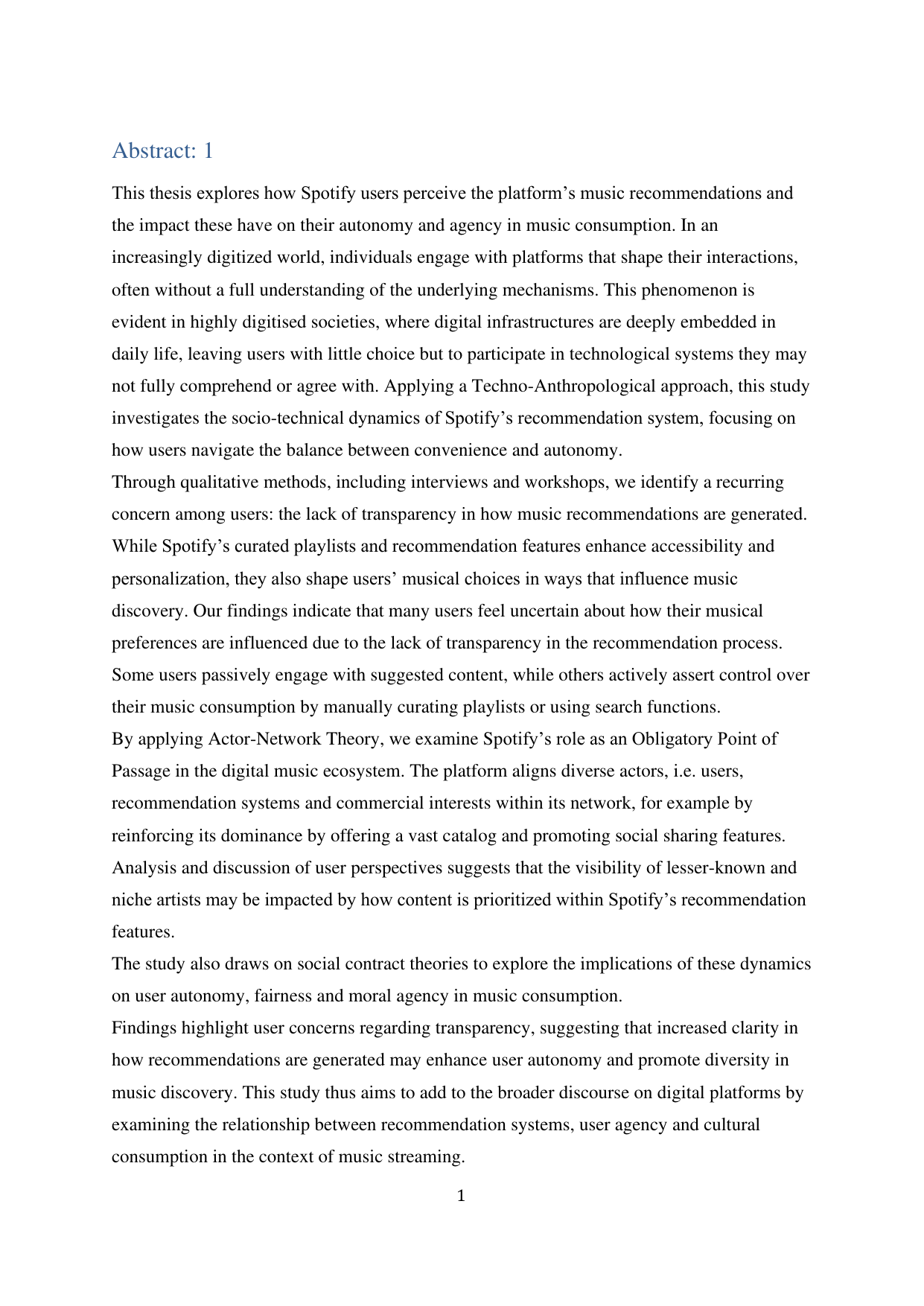
User Autonomy and Music Consumption on Spotify
Term
4. term
Education
Publication year
2025
Submitted on
2025-01-30
Pages
56
Abstract
This thesis explores how Spotify users perceive the platform’s music recommendations and the impact these have on their autonomy and agency in music consumption. In an increasingly digitized world, individuals engage with platforms that shape their interactions, often without a full understanding of the underlying mechanisms. This phenomenon is evident in highly digitised societies, where digital infrastructures are deeply embedded in daily life, leaving users with little choice but to participate in technological systems they may not fully comprehend or agree with. Applying a Techno-Anthropological approach, this study investigates the socio-technical dynamics of Spotify’s recommendation system, focusing on how users navigate the balance between convenience and autonomy. Through qualitative methods, including interviews and workshops, we identify a recurring concern among users: the lack of transparency in how music recommendations are generated. While Spotify’s curated playlists and recommendation features enhance accessibility and personalization, they also shape users’ musical choices in ways that influence music discovery. Our findings indicate that many users feel uncertain about how their musical preferences are influenced due to the lack of transparency in the recommendation process. Some users passively engage with suggested content, while others actively assert control over their music consumption by manually curating playlists or using search functions. By applying Actor-Network Theory, we examine Spotify’s role as an Obligatory Point of Passage in the digital music ecosystem. The platform aligns diverse actors, i.e. users, recommendation systems and commercial interests within its network, for example by reinforcing its dominance by offering a vast catalog and promoting social sharing features. Analysis and discussion of user perspectives suggests that the visibility of lesser-known and niche artists may be impacted by how content is prioritized within Spotify’s recommendation features. The study also draws on social contract theories to explore the implications of these dynamics on user autonomy, fairness and moral agency in music consumption. Findings highlight user concerns regarding transparency, suggesting that increased clarity in how recommendations are generated may enhance user autonomy and promote diversity in music discovery. This study thus aims to add to the broader discourse on digital platforms by examining the relationship between recommendation systems, user agency and cultural consumption in the context of music streaming.
This thesis explores how Spotify users perceive the platform’s music recommendations and the impact these have on their autonomy and agency in music consumption. In an increasingly digitized world, individuals engage with platforms that shape their interactions, often without a full understanding of the underlying mechanisms. This phenomenon is evident in highly digitised societies, where digital infrastructures are deeply embedded in daily life, leaving users with little choice but to participate in technological systems they may not fully comprehend or agree with. Applying a Techno-Anthropological approach, this study investigates the socio-technical dynamics of Spotify’s recommendation system, focusing on how users navigate the balance between convenience and autonomy. Through qualitative methods, including interviews and workshops, we identify a recurring concern among users: the lack of transparency in how music recommendations are generated. While Spotify’s curated playlists and recommendation features enhance accessibility and personalization, they also shape users’ musical choices in ways that influence music discovery. Our findings indicate that many users feel uncertain about how their musical preferences are influenced due to the lack of transparency in the recommendation process. Some users passively engage with suggested content, while others actively assert control over their music consumption by manually curating playlists or using search functions. By applying Actor-Network Theory, we examine Spotify’s role as an Obligatory Point of Passage in the digital music ecosystem. The platform aligns diverse actors, i.e. users, recommendation systems and commercial interests within its network, for example by reinforcing its dominance by offering a vast catalog and promoting social sharing features. Analysis and discussion of user perspectives suggests that the visibility of lesser-known and niche artists may be impacted by how content is prioritized within Spotify’s recommendation features. The study also draws on social contract theories to explore the implications of these dynamics on user autonomy, fairness and moral agency in music consumption. Findings highlight user concerns regarding transparency, suggesting that increased clarity in how recommendations are generated may enhance user autonomy and promote diversity in music discovery. This study thus aims to add to the broader discourse on digital platforms by examining the relationship between recommendation systems, user agency and cultural consumption in the context of music streaming.
Documents
